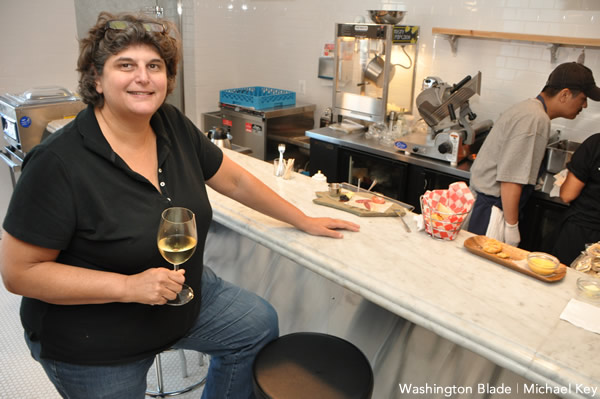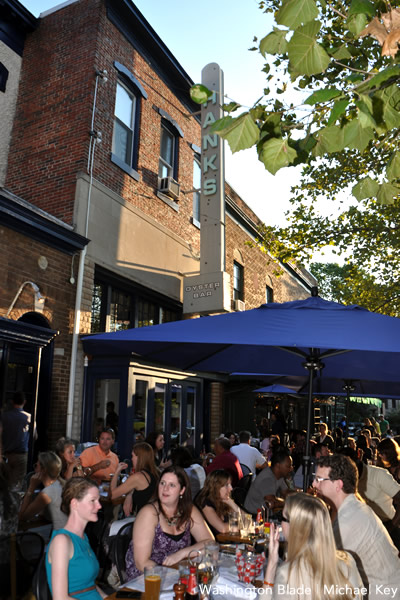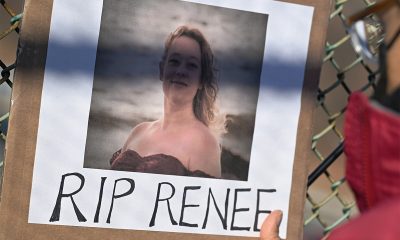Local
Lesbian restaurant owner appeals for help in dispute
Hank’s Oyster Bar forced to close part of patio during Pride
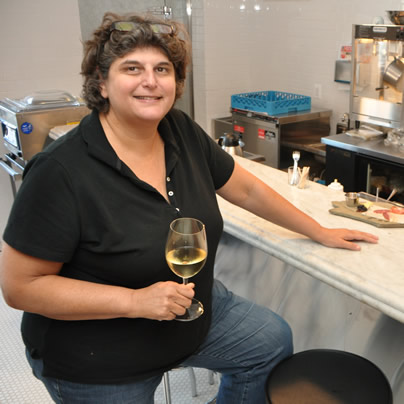
The lesbian owner of a popular seafood restaurant along the 17th Street business district near Dupont Circle is asking the community to support the repeal of a city law that she says allowed six people to force her to reduce her outdoor seating capacity from 40 to 20 customers.
Jamie Leeds, the chef and owner of Hank’s Oyster Bar at 1624 Q Street, N.W., issued a statement over the weekend informing customers and supporters that inspectors with the city’s Alcoholic Beverage Control Board ordered her on Friday night, June 8, to close half of the restaurant’s patio space.
Leeds said that the order came the day before the annual Capital Pride Parade was to travel past her patio, limiting the number of patrons who wanted to dine on the patio while watching the parade.
“This action shutting down half of our outdoor patio on the night before the annual parade was the result of one of the license protestants phoning in a complaint to the city, and occurs before we have even had a hearing before the ABC Board,” Leeds said in an open letter to the community.
“The ongoing harassment by this small band of residents is astonishing and the timing of this individual’s complaint before the annual celebration is despicable,” she wrote in her letter.
Leeds’ call for the repeal of the law that allows as few as five citizens to contest liquor license applications comes at a time when gay and straight nightlife advocates have urged gay D.C. Council member Jim Graham (D-Ward 1) to consider introducing legislation to ease what the advocates say are overly burdensome regulations pertaining to such businesses. Graham chairs the Council committee that oversees the city’s liquor laws and the agency that enforces them.
Michael Hibey, the attorney representing the six residents opposing Hank’s Oyster Bar’s use of the expanded outdoor seating, declined to comment. David J. Mallof, one of the six nearby residents who has taken a lead role in opposing Hank’s expansion of its outdoor seating, also declined to comment.
The Blade couldn’t immediately reach the other five residents opposing the termination of the voluntary agreement. They are: Alexis Rieffel, Ralph N. Johnson, Susan Meehan, Michael Fasano and Patricia E. Steele.
Fred Moosally, director of the city’s Alcoholic Beverage Regulation Administration, which oversees the ABC Board, confirmed on Monday that the inspectors responded to a complaint by a representative of the six residents opposed to the restaurant’s expansion.
But Moosally told the Blade that the call for restricting the patio’s use was in response to a May 17 D.C. Court of Appeals decision ordering the city to reinstate a document known as a voluntary agreement between Leeds and the six residents. The agreement bars Hank’s from expanding its patio or any part of the restaurant beyond the space it occupied at the time it opened in 2005.
At Leeds’ request and following an earlier hearing, the board terminated the voluntary agreement in 2010, allowing her to expand into outdoor and indoor space in an adjacent building that became vacant that year.
The six residents appealed the board’s action to the Court of Appeals. The court voided the board’s order terminating the voluntary agreement and remanded the case back to the board. It instructed the board to consider two issues the court said the board was legally required to consider but failed to do so at the time it terminated the voluntary agreement.
Moosally said ABC Board inspectors informed Leeds on June 2 during a visit to the restaurant of the court ruling and its effect of reinstating her voluntary agreement. Although he didn’t say so directly, he implied that Hank’s knew more than a week before the Pride parade that it couldn’t use the full space of the patio at the time of the June 9 parade.
Andrew Kline, a licensing counsel representing Leeds before the ABC Board, disputes Moosally’s assessment, saying he believes the board had to take “another step” of rescinding its 2010 order terminating the voluntary agreement before it could require Hank’s to give up use of the full patio.
Kline said the court decision didn’t prevent the board from allowing Hank’s to continue to use its full patio while the board deliberates over its decision, as mandated by the court, to make a determination on whether the voluntary agreement should once again be terminated.
The board scheduled a hearing on Wednesday, June 13, to address issues that the appeals court said must be resolved before the board can make a final decision on whether to retain or terminate the voluntary agreement.
The court decision was the latest development in a seven-year dispute between Hank’s Oyster Bar and the handful of nearby residents, who have contested the restaurant’s liquor license in an effort to obtain restrictions through the voluntary agreement.
Leeds says in her letter that she was pressured into signing the voluntary agreement in 2005, the year she opened the restaurant, as a condition to end a formal protest of the license by the six residents. She said the license protest could have dragged on for months, delaying her ability to obtain a liquor license and jeopardizing her ability to open her new business.
Most observers following the dispute, including LGBT activists, believe Hank’s opponents are motivated by an aversion to an “overconcentration” of liquor serving establishments on 17th Street, which the opponents say have the potential for causing neighborhood disturbances. Most observers don’t think the opponents of Hank’s expansion are motivated by anti-gay sentiment.
But many LGBT activists have teamed up with nightlife advocates in calling on the City Council to repeal the law that gives as few as five residents legal standing to challenge a liquor license and push for restrictions similar to those in the voluntary agreement signed by Hank’s.
They point out that Hank’s has never caused any problems in the neighborhood, either before or after it expanded its operations into the adjacent space in 2011.
Although the ABC Board makes the final decision on approving a voluntary agreement or approving restrictions on the operation of bars and restaurants, business owners have said a protest by a “gang of five,” as the business owners have called the protesting residents, can hold up a license for months. They say the delays result in high monetary costs for legal fees and the cost of renting spaces that can’t generate revenue until the license is approved.
One proposal offered by nightlife advocates is to eliminate the existing provision of the liquor law that gives five or more citizens authority to contest liquor licenses and restrict that authority to the elected Advisory Neighborhood Commissions. ANC’s currently have that authority.
“If you agree that allowing a small number of individuals to dictate what happens in our community is wrong, please contact ABRA; Ward 2 Council member Jack Evans; Council member Jim Graham, chair of the committee that oversees ABC [Board issues]; and Mayor Vincent Gray,” Leeds said in her open letter. “The right of a group of 5 residents to hold up a license application should be eliminated from the law.”
Leeds’ letter came two days after Mayor Gray told a joint Capital Pride-Washington Blade town hall meeting that he was concerned over the ability of just five people to block licensing applications for businesses such as restaurants.
“I don’t think a small handful of people should be given the opportunity to unreasonably hold up action on something that a preponderance of the people want to move forward on,” Gray said.
“I have always believed that most so-called ‘voluntary agreements’ are actually ‘coerced’ agreements,’” said gay activist Peter Rosenstein, who lives about two blocks from Hank’s.
“[T]his case should convince the City Council and the mayor to change the law,” Rosenstein said. “We live in a democracy and allowing a complaint by five people to determine what is seating capacity for a restaurant is clearly not democracy.”
Rick Rosendall, vice president of the Gay and Lesbian Activists Alliance and a resident of 17th Street near Hank’s Oyster Bar, characterized as “outrageous” the action by the six residents to restrict Hank’s patio usage.
“It is absurd and harmful, and D.C. Council members and Mayor Gray need to hear from people who appreciate that the neighborhood and the city are not served by allowing small, unrepresentative groups to hold everyone else hostage to their cramped, entitlement-drenched desire to turn thriving urban neighborhoods into quiet suburbs,” Rosendall said.
One of the court’s requirements is that Leeds makes a “good faith” effort to reach a new voluntary agreement with the six residents, something Leeds doesn’t think is possible.
“[W]e did try to work this out with those opposed to us back when we first sought termination of the VA, but they refused to meet,” she said. “Since the Court of Appeals decision was reached, we offered to address their concerns with a more limited VA, but they insist we cut our outdoor occupancy by 25 percent, even though there have been no complaints.”
The second requirement is to show that the neighborhood has changed since the time the agreement was signed in 2005 that would support terminating the agreement. Kline said one key change that has occurred is the ABC Board repealed part of a longstanding 17th Street moratorium on new liquor licenses that prevented bars and restaurants from laterally expanding to adjacent buildings or properties.
The Dupont Circle Advisory Neighborhood Commission, which supports allowing Hank’s to expand its patio, supported the lifting of the moratorium on lateral expansion.
The president of the Dupont Circle Citizens Association, Doug Rogers, issued a statement on Monday denouncing the ABC Board’s decision to shut down Hank’s expanded patio operation, saying the board should have waited until after its scheduled hearing on June 13.
“What is even more infuriating is that two toxic people in our neighborhood are allowed to shut down part of a legitimate business and force them to spend thousands of dollars in legal fees,” Rogers said in his statement. “Their ability to do this should be eliminated from D.C. law, and I urge Mayor Gray and the D.C. Council to reform D.C.’s archaic regulatory laws.”
Maryland
Layoffs and confusion at Pride Center of Maryland after federal grants cut, reinstated
Trump administration move panicked addiction and mental health programs
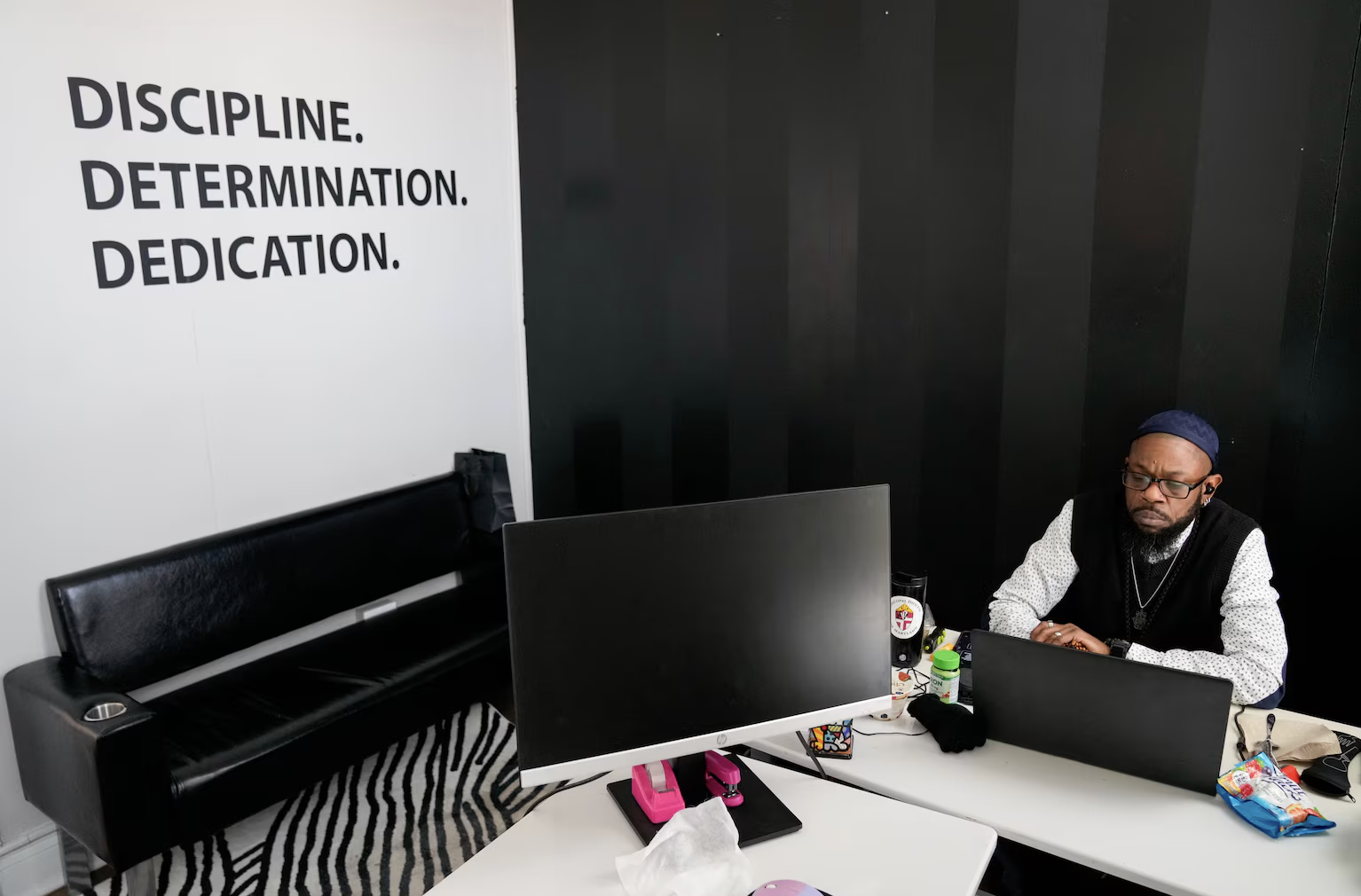
By ALISSA ZHU | After learning it had abruptly lost $2 million in federal funding, the Pride Center of Maryland moved to lay off a dozen employees, or about a third of its workforce, the Baltimore nonprofit’s leader said Thursday.
The group is one of thousands nationwide that reportedly received letters late Tuesday from the Trump administration. Their mental health and addiction grants had been terminated, effective immediately, the letters said.
By Wednesday night, federal officials moved to reverse the funding cuts by the Substance Abuse and Mental Health Services Administration, estimated to total $2 billion, according to national media reports. But the Pride Center of Maryland’s CEO Cleo Manago said as of Thursday morning he had not heard anything from the federal government confirming those reports.
The rest of this article can be read on the Baltimore Banner’s website.
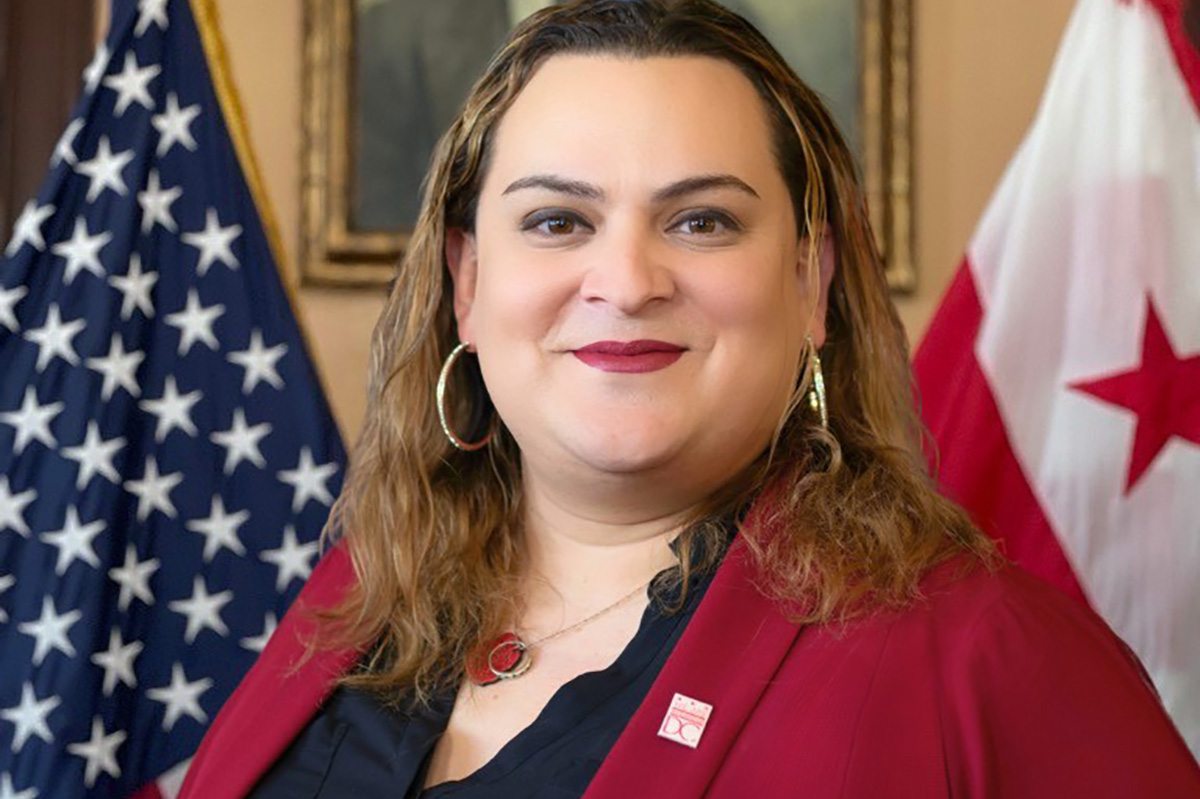
The Comings & Goings column is about sharing the professional successes of our community. We want to recognize those landing new jobs, new clients for their business, joining boards of organizations and other achievements. Please share your successes with us at [email protected].
Congratulations to Vida Rangel, JD/MPP on her promotion to Deputy Director of the Mayor’s Office of Talent and Appointments. Rangel is now the highest-ranking transgender official in the history of District government. On accepting the position Rangel said, “I am proud to step into this leadership role and to continue serving my communities. Our District is full of passionate and knowledgeable people who are committed to public service, and it is an honor to help them explore opportunities to serve their neighbors.”
Rangel has previously served in this office as Director of Operations. Prior to this as Bargaining Committee Chair, Organizing Committee, NCTE United, Nonprofit Professional Employees Union IFTPE Local 70. As Policy Counsel, National Center for Transgender Equality; and Elizabeth Warren for President, lead organizer, Illinois 4th Congressional District. She has worked with, and served on boards of, The Black & Pink National, Federal City Performing Arts Assoc., and LAGBAC.
Rangel earned her bachelor’s in sociology from Sam Houston State University; master’s of Public Policy from Loyola University, Chicago; and Juris Doctor, Loyola University, Chicago.
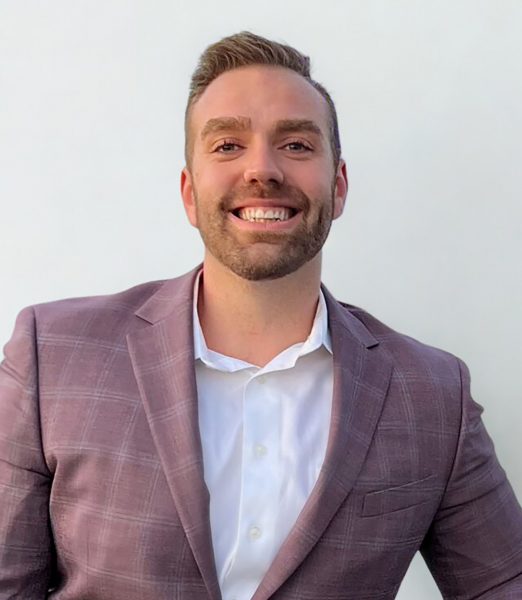
Congratulations also to James Conlon new PFLAG vice president of Development & Philanthropic Partnerships. Upon his appointment Conlon said, “It is an absolute privilege to join PFLAG National and lead their Development & Philanthropic Partner team into a new era. Right now, LGBTQ+ people and their families are terrified of what the future might bring, and PFLAG must continue to be there. My job is to ensure PFLAG strongly endures and thrives, because never has there been a clearer time for our community to unite in fighting for the dignity and well-being of every LGBTQ+ person.”
Brian Bond, CEO, PFLAG National, said, “At a time when PFLAG National programs and participation in them have grown significantly, even as corporate giving has left a $1.3M gap in our funding, James is a critical new addition to the team. With his vast expertise, James will drive our growth and ensure that PFLAG continues meeting the needs of families and communities across the country.”
Conlon is a seasoned fundraiser who has spent extensive time working with advocates, supporters, and leaders, of the LGBTQ+ movement to understand how to effectively support the community. He began his career as an intern in the Massachusetts State House. He has helped raise more than $60 million for critical causes and candidates. Prior to joining PFLAG James oversaw LGBTQ+ investments and fundraising, with the Democratic National Committee (DNC). Prior to that he served in the same role for Harris-Walz 2024, and additionally served in senior fundraising positions for the Senate Majority PAC, as well as for Representatives Josh Gottheimer, and Conor Lamb.
Conlon earned his bachelor’s degree in political science and government from the University of Massachusetts, Amherst.
District of Columbia
D.C.’s annual MLK Peace Walk and Parade set for Jan. 19
LGBTQ participants expected to join mayor’s contingent
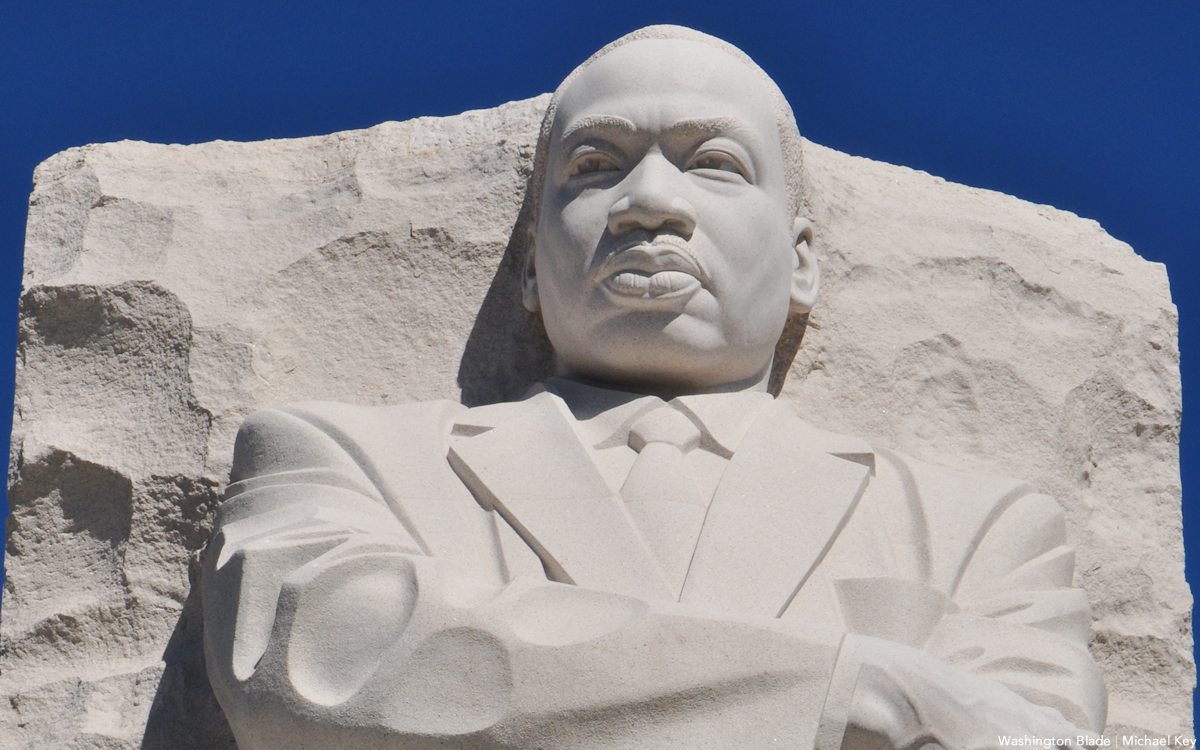
Similar to past years, members of the LGBTQ community were expected to participate in D.C.’s 21st annual Martin Luther King Jr. Day Peace Walk and Parade scheduled to take place Monday, Jan. 19.
Organizers announced this year’s Peace Walk, which takes place ahead of the parade, was scheduled to begin at 10:30 a.m. at the site of a Peace Rally set to begin at 9:30 a.m. at the intersection of Firth Sterling Avenue and Sumner Road, S.E., a short distance from Martin Luther King Jr. Avenue.
The Peace Walk and the parade, which is scheduled to begin at 11 a.m. at the same location, will each travel along Martin Luther King Jr. Avenue a little over a half mile to Marion Barry Avenue near the 11th Street Bridge where they will end.
Japer Bowles, director of D.C. Mayor Muriel Bowser’s Office of LGBTQ Affairs, said he and members of his staff would be marching in the parade as part of the mayor’s parade contingent. In past years, LGBTQ community members have also joined the mayor’s parade contingent.
Stuart Anderson, one of the MLK Day parade organizers, said he was not aware of any specific LGBTQ organizations that had signed up as a parade contingent for this year’s parade. LGBTQ group contingents have joined the parade in past years.
Denise Rolark Barnes, one of the lead D.C. MLK Day event organizers, said LGBTQ participants often join parade contingents associated with other organizations.
Barnes said a Health and Wellness Fair was scheduled to take place on the day of the parade along the parade route in a PNC Bank parking lot at 2031 Martin Luther King Jr. Ave., S.E.
A statement on the D.C. MLK Day website describes the parade’s history and impact on the community.
“Established to honor the life and legacy of Rev. Dr. Martin Luther King, Jr., the parade united residents of Ward 8, the District, and the entire region in the national movement to make Dr. King’s birthday a federal holiday,” the statement says. “Today, the parade not only celebrates its historic roots but also promotes peace and non-violence, spotlights organizations that serve the community, and showcases the talent and pride of school-aged children performing for family, friends, and community members.”
-

 Photos5 days ago
Photos5 days agoPHOTOS: ‘ICE Out For Good’ Sunday protests
-

 U.S. Supreme Court3 days ago
U.S. Supreme Court3 days agoSupreme Court hears arguments in two critical cases on trans sports bans
-

 Arts & Entertainment5 days ago
Arts & Entertainment5 days agoTeyana Taylor, Erin Doherty have big night at Golden Globes
-

 Virginia5 days ago
Virginia5 days agoMark Levine running in ‘firehouse’ Democratic primary to succeed Adam Ebbin

